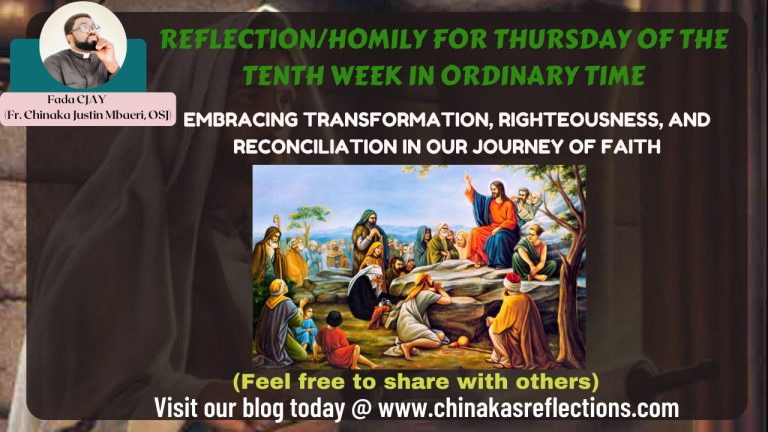EMBRACING TRANSFORMATION, RIGHTEOUSNESS, AND RECONCILIATION IN OUR JOURNEY OF FAITH
First Reading: 2 Corinthians 3:15-4:1,3-6
Responsorial Psalm: Ps. 84(85):9-14
Gospel Reading: Matthew 5:20-26
____________________________
The five discourses of Christ in the gospel of Matthew have been thought to mirror a doctrinal character. This is because the Pentateuch has five books, and these books correspond with the five discourses of Christ in the gospel of Matthew. Just as Moses received the Law from God on Mount Sinai and teaches the people, Christ also interprets and teaches the Law in five discourses beginning with the “Sermon on the Mount”. This way, the community of Matthew comprehends Christ as the New Moses; the one who has the sole authority to interpret and fulfill the Law (“Do not think that I have come to abolish the Law or the Prophets; I have not come to abolish them but to fulfill them” – Mt. 5:17). Delivering his Sermon on the Mount (the first of his discourses, cf. Mat. Chapter 5 – 7), Jesus (the new Moses, better still one who is greater than Moses) proclaims the Kingdom of God and its demands, offering us profound insights into the nature of our relationship with God and with one another. Together with the first reading and gospel, we come to see themes of transformation, righteousness, and reconciliation.
As the authentic interpreter of the Law, Jesus recalls the Old Law as seen in today’s gospel reading: “You have learnt how it was said to our ancestors: You must not kill; and if anyone does kill he must answer for it before the court.” After this, He interprets it with authority, saying: “But I say this to you…” This way, He not only speaks against killing but also against the occasions and circumstances that may lead one to kill his fellowman – anger, foul language, etc. The Pharisees who were noted as the interpreters and teachers of the Jewish Law would stop at “thou shall not kill” due to their inability to comprehend it clearly as though faced with “spiritual blindness”; however, for Christ, it is not enough to stay away from killing another man, but also to avoid situations that offend and harm others. Little wonder Christ says: ‘If your virtue goes no deeper than that of the scribes and Pharisees, you will never get into the kingdom of heaven.’ Consequently, Jesus highlights the importance of reconciliation and forgiveness in our relationships. He reminds us that being reconciled with others takes precedence over religious rituals. Our worship and devotion to God must be accompanied by a sincere effort to reconcile with those we have wronged or who have wronged us. True righteousness is lived out in our actions and attitudes toward others. Similarly, St. Paul in the second reading, addresses the transformative power of the gospel message. The reference to the veil covering the hearts of the people suggests a spiritual blindness or inability to understand the message of God. It implies that there are barriers preventing some individuals from fully grasping the truth and significance of the gospel. Paul emphasizes that it is through the Spirit that we are transformed and renewed, moving from darkness to light, from spiritual blindness to seeing the glory of God in the face of Christ. This transformation is not something we can achieve on our own, but it is a work of God’s grace in us. It calls us to open our hearts to the transforming power of the Spirit and to allow Him to mold us into the image of Christ. This way, we come to grow deeper in virtue and live beyond the superficial pharisaic lifestyle of just adhering to the letters alone.
Dear friends in Christ, today’s readings remind us that our faith is not simply a set of rules and rituals to be followed. It is a transformative journey, guided by the Spirit, that leads us to embrace God’s righteousness and to live in reconciliation with one another. We are called to be agents of transformation, extending forgiveness and seeking reconciliation with those around us. Our pursuit of righteousness should be marked by genuine love, mercy, and a willingness to repair broken relationships. As we reflect on these readings, let us ask ourselves: How is the Spirit transforming us? Are we seeking God’s righteousness and allowing it to guide our actions and attitudes? Are we actively cooperating with the Spirit in helping us take away our spiritual blindness? May the Holy Spirit empower us to embrace transformation, seek God’s righteousness, and foster reconciliation in our lives. Let us remember that it is through our transformed lives that we become beacons of light and witnesses to the love and mercy of our Lord Jesus Christ. This is indeed the kind of deeper virtue that Christ demands from us today.
(CLICK HERE FOR THE NEXT DAY’S REFLECTION: REFLECTION/HOMILY FOR THE SOLEMNITY OF THE MOST SACRED HEART OF JESUS)
Shalom!
© By Fr. Chinaka Justin Mbaeri, OSJ
Paroquia Nossa Senhora de Loreto, Vila Medeiros, São Paulo.
nozickcjoe@gmail.com / fadacjay@gmail.com
___________________________________
PS: Have you prayed your Rosary today?


